Books
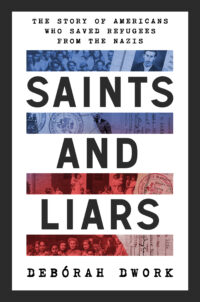
Saints and Liars: The Story of Americans Who Saved Refugees from the Nazis
Dwork, Debórah (2025). New York: W.W. Norton.
Long before their country joined the war, American aid workers undertook rescue efforts abroad. Saints and Liars unearths the story of rescue workers in five key cities as the situation grew increasingly dire. Who were these women and men who sought to save lives? What did they accomplish, and how did they manage these feats? Exploring their experiences, Saints and Liars illuminates the moral questions they encountered, the devastating decisions they had to make, and the role of unpredictable and irrational factors on the ground, at a particular moment, in shaping individual fates.
In Saints and Liars Debórah Dwork tells a gripping story of individual American activists – Unitarians, Quakers, Jews – navigating the dark corners of wartime Prague, Vilna, Shanghai, Marseille, and Lisbon in an effort to save vulnerable people from the Nazis. Her book reads like a novel by Alan Furst or Joseph Kanon, while also delivering a powerful and moving portrait of what brave (though complicated) people could do in response to Nazi persecution. This is a brilliant work of historical reconstruction which, sadly, is also highly timely.
Benjamin Hett, Professor of History, CUNY. Author of The Nazi Menace
In Saints and Liars, Debórah Dwork deftly examines rescue efforts in five cities. She peels back layers of complexity, each microhistory highlighting the importance of luck, timing, resourcefulness, and connections. . . . Startlingly relevant in today’s world-wide refugee crisis, Saints and Liars serves as a primer to all of us trying to understand the complex, messy and urgent work of rescue.
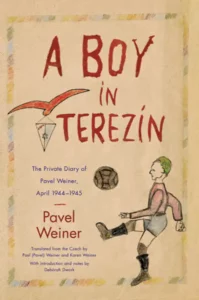
A Boy in Terezin: The Private Diary of Pavel Weiner, April 1944-April 1945
Weiner, Pavel; Dwork, Debórah (2012).Evanstan, IL: Northwestern University Press.
Written by a Czech Jewish boy in the transit camp the Germans called Theresienstadt, A Boy in Terezin covers a year of his life, from April 1944 until liberation in April 1945; it was his bar mitzvah year. Famous people and infamous figures flit across the pages. But the focus is always on Pavel. Through him, we see how youngsters lived life on many levels, negotiating the complexity of the transit camp regime.
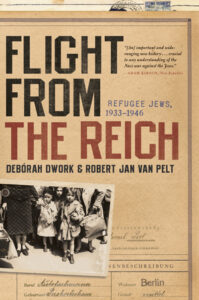
Flight from the Reich: Refugee Jews, 1933–1946
Dwork, Debórah; van Pelt, Robert (2009). New York: W.W. Norton. Translations: Dutch (Elmar); French (Calmann-Lévy).
ForeWord Reviews Book of the Year Award Finalist.
Fleeing did not write refugees out of the story of the Holocaust, it simply took the story elsewhere. Flight from the Reich opens the geographic view of the Holocaust, integrates the refugee experience in that history, and extends the temporal frame to the postwar years. In this multi-faceted tale of Jewish refugees during and after the Nazi era, the authors braid the private and the public realms, personal memory and official history.
"An important and wide-ranging new history. . . . The story of the refugees . . . is crucial to any understanding of the Nazi war against the Jews."
Tablet
"A bright shining accomplishment in Holocaust studies. . . . This is a great and powerful book . . . a masterpiece in its own right."
Open Letters
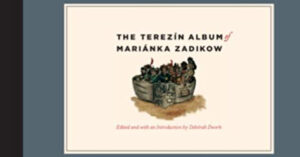
The Terezín Album of Mariánka Zadikow
Dwork, Debórah (2008). Chicago: University of Chicago Press. An annotated, edited poesie album.
An imprisoned bookbinder secretly crafted a small blank book from pilfered materials at the Terezín (Theresienstadt) transit camp in September 1944. He presented the album to a fellow prisoner, twenty-one-year-old Mariánka Zadikow. As the Germans pressed forward with mass deportations from Terezín to Auschwitz, Mariánka collected inscriptions and sketches from her fellow inmates. The words and images—by children and grandparents, factory workers and farmhands, professionals and intellectuals, musicians and artists—capture a kaleidoscope of sentiments and experiences, and offer an intimate window onto history.
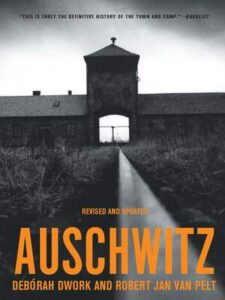
Auschwitz (Revised Edition, 2008); Auschwitz: 1270 to the Present (First Edition, 1996)
Dwork, Debórah; van Pelt, Robert. New York: W.W. Norton. Translations: Czech (Argo); Dutch (Boom; revised edition Verbum); German (Pendo); Polish (Swiat Ksiazki).
National Jewish Book Award and the Spiro Kostoff Award. Selected by Newsweek as one of the Ten Best Books about Poland during World War II. Emmy-nominated BBC documentary, “Auschwitz: The Blueprints of Genocide.”
Dwork and van Pelt’s innovative use of architectural evidence to understand Auschwitz, and the way they move their lens from German plans and practices to how these translated into the lived experience of Jewish inmates, broke new historiographical ground.
A new and brilliant work about an evil place . . . . It’s a chilling story of the most extreme manifestation of evil by the Third Reich.
Minneapolis Star Tribune
“A vivid new representation of the Holocaust’s unfolding. . . . The rigor and directness of their account shakes even the knowledgeable reader.”
The Wall Street Journal
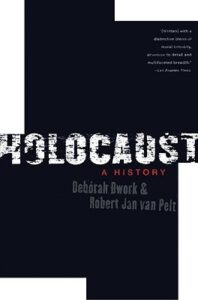
Holocaust: A History
Dwork, Debórah; van Pelt, Robert (2002). New York: W. W. Norton. Translations: Dutch (Boom); Portuguese (Imago); Spanish (EDAF).
National Jewish Book Award Finalist.
A magisterial, dramatic account that reshapes the way we think and talk about the greatest crime in history.
Holocaust was the first work to marry the history of the World War II and the history of the Holocaust and to intertwine the history of the perpetrators and that of the victims. Tracking the Germans’ assault on the Jews as the Reich devoured Europe, Holocaust tells a story of social, political, and cultural upheaval, and moral agony. Above all, Holocaust is a story about people. A lot of them were perpetrators and collaborators, far too many were victims, most were bystanders and witnesses. Only a few were rescuers and resisters.
A distinctive blend of moral intensity, attention to detail and multifaceted breadth.
Los Angeles Times
The reader looking for a clear and readable account of how Hitler and the Nazis came to conceive and carry out their diabolical project need look no further than this book.
Boston Globe

Voices and Views: A History of the Holocaust.
Dwork, Debórah (2002). New York: Jewish Foundation for the Righteous and the University of Wisconsin Press.
An edited, annotated, and illustrated collection, with introductions; a scholarly project undertaken for public service.
In Voices & Views Debórah Dwork has brought together many of the most important figures in Jewish scholarship to produce a definitive collection of essays, documents, and images on the Holocaust.
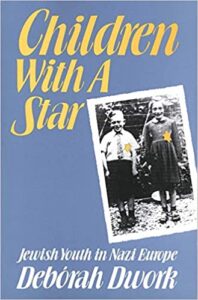
Children With A Star: Jewish Youth in Nazi Europe
Dwork, Debórah (1991). New Haven: Yale University Press. Translations: Dutch (Boom); German (Beck); Italian (Marsilio); Japanese (Sogen Sha).
National Jewish Book Award Finalist.
Recognizing that history focused on the adult world and that children were seen as future participants in that realm, Dwork imagined a new “child-centered” approach. A wholly original theoretical development, Dwork’s child-centered history opened a fresh area of historical investigation. Her now classic Children With A Star gave voice to the silenced children of the Holocaust; it was the first history of the daily lives of young people caught in the net of Nazism.
Debórah Dwork possesses the art of inducing [these survivors] to speak, just as she possesses the art of listening.
Elie Wiesel, Newsday
A book which must be read.
Peter Ackroyd, The Times
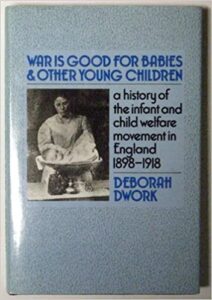
War Is Good for Babies and Other Young Children: A History of the Infant and Child Welfare Movement in England 1898–1918.
Dwork, Debórah (1987). London; New York: Tavistock Publications.
War is Good for Babies examines the development of a modern welfare system prior to the introduction of the welfare state within the context of such questions as the interests of the state and the sanctity of the family, the role of women in the home and the work force, and the concept of children’s rights and their need for protection.
